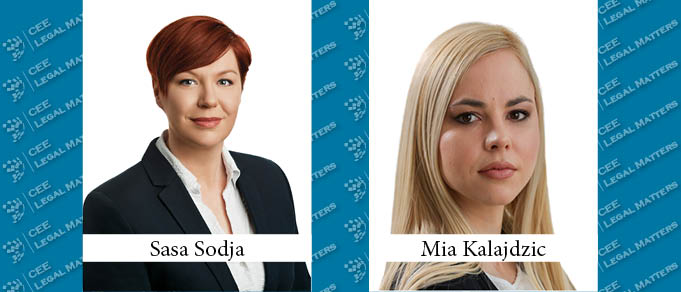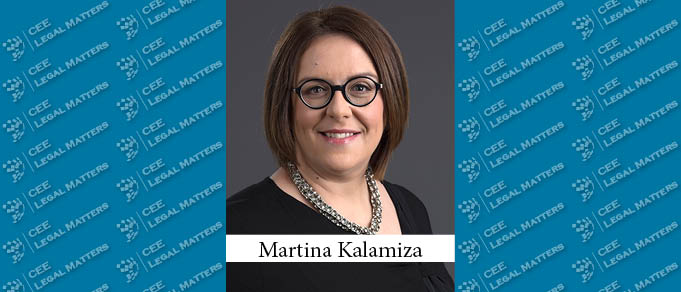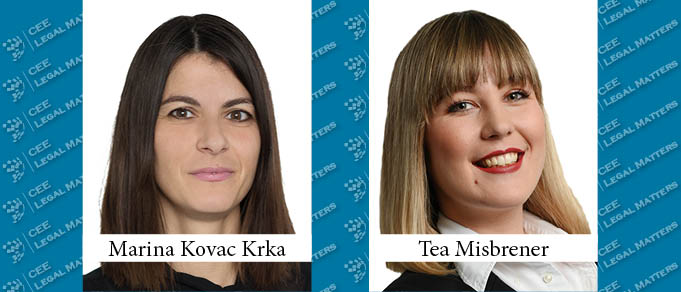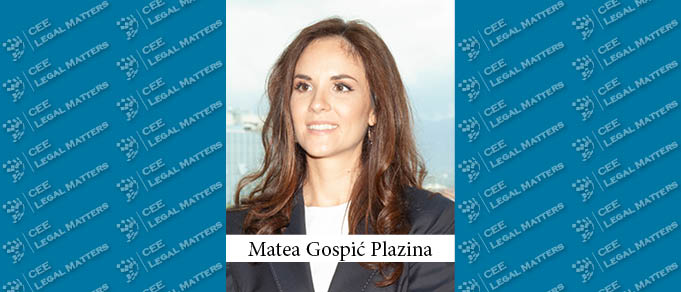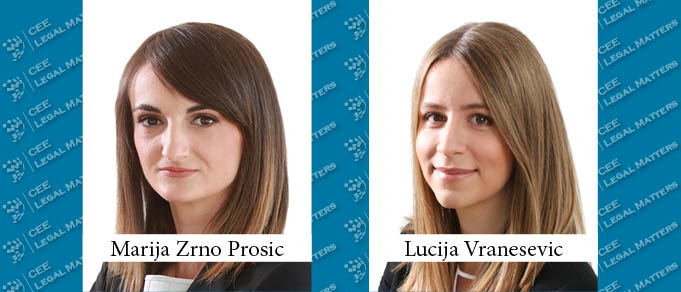The biggest story in Croatia, according to Kovacevic Prpic Simeunovic Partner Martina Prpic, is the preparatory work for the upcoming switch to EUR as the official currency, complemented by EU-driven updates impacting consumer protection, agriculture, and the upcoming tourist season.
Mia Kalajdzic and Sasa Sodja Make Partner at CMS
Former Senior Associate Mia Kalajdzic has been appointed Partner and Head of the Employment practice area group at CMS Croatia, while former Senior Associate Sasa Sodja was appointed Partner and Head of the Corporate and M&A practice at CMS Slovenia.
Closing: United Group's Acquisition of Majority Stake in Optima Telekom Now Closed
On January 26, DTB announced that United Group's acquisition of the majority stake in Optima Telekom (reported by CEE Legal Matters on July 16, 2021) has now closed.
Are Financings and Bonds Green in Croatia?
Sustainable finance is at the very heart of the financial system ensuring financial service providers offer green products and push them and the corporate businesses to be greener, to reach a higher level of social and corporate relevance when making investment or financing decisions.
Croatia: Inadequate Legislation May Sow Uncertainty and Chill Investments in IT Infrastructure
The Croatian tech sector has been booming lately. With Rimac and Infobip achieving unicorn status, several other tech companies well on their way to a valuation above EUR 1 billion, and the recent successful listing of several IT companies, it seems like the Croatian tech party is going strong, and everyone is invited.
Kinstellar Integrates Zuric i Partneri to Expand in Croatia
Kinstellar has announced it is entering the Croatian market by integrating the Zuric i Partneri (ZiP) law firm. While the local firm will keep its name, "ZiP is now a fully integrated office of Kinstellar."
Nebojsa Vitez and Luka Porobija Make Equity Partner at Porobija & Spoljaric
Nebojsa Vitez and Luka Porobija have been promoted to Equity Partners at Porobija & Spoljaric as of January 1, 2022.
Real Estate Laws and Regulations in Croatia
Contributed by Hanzekovic & Partners.
Croatia to Start Renewables Auctions for Large-scale Projects in Spring 2022
Last week two key regulatory changes took place that will have important implications for future development of the Croatian renewable energy market.
Croatia: WhatsApp Correspondence Constitutes Credible Evidence of Anti-Competitive Agreements
On July 21, 2021, the Croatian High Administrative Court confirmed the Croatian Competition Agency’s (CCA) cartel decision adopted against 14 Croatian driving schools. In its infringement decision dated December 30, 2019, the CCA established the existence of a price-fixing cartel between 14 Croatian driving schools and imposed fines in the total amount of HRK 415,000 (approximately EUR 55,500). During this cartel investigation the CCA conducted several dawn raids and established the existence of a price-fixing cartel based on, inter alia, WhatsApp correspondence exchanged between representatives and employees of cartel members. Based on CCA’s infringement decision, the content of exchanged WhatsApp correspondence between cartel members referred to the coordinated price increases for driving lessons starting from the beginning of 2018.
The Buzz in Croatia: Interview with Martina Kalamiza of Divjak, Topic, Bahtijarevic & Krka
Political stability and predictability, shake-ups for the corporate and banking legislative frameworks, and a solid economic situation despite the pandemic – these are the current highlights in Croatia, according to Divjak, Topic, Bahtijarevic & Krka Partner Martina Kalamiza.
Rimac Goes Hyper
Earlier this year, the start-up scene in Croatia picked up speed with the Rimac Automobili – Bugatti deal. The burgeoning Croatian manufacturer, which focuses on constructing electric hypercars, struck a deal with global automotive giant Bugatti, a subsidiary of Volkswagen, to form a joint venture for the production of next-generation supercars.
Croatia: New Electronic Media Act Brings Changes to Concentrations in Electronic Media Sector
Croatian Parliament recently adopted the final draft of the new Electronic Media Act (the Act), which entered into force on 22 October 2021.
Reforming Energy in Croatia – Electrifying Times Ahead
These are dynamic times for the Croatian energy sector, as the legislative framework is expected to undergo major changes very soon.
The Buzz in Croatia: Interview with Marina Mesic of Cipcic-Bragadin Mesic & Associates
With political changes on a local level in the nation’s capital and a booming tourism season, Croatia keeps defying the odds and making good progress despite an ongoing global pandemic, according to Cipcic-Bragadin Mesic & Associates Partner Marina Mesic.
Environmental, Social and Governance (ESG) - Real Estate & M&A Impacts
What is ESG? ESG refers to the three key factors (environmental, social and governance) when measuring the sustainability and ethical impact of an investment in a business or company and it is commonly used in capital markets and commonly used by investors to evaluate the behavior of the companies, as well as determining their future financial performance.
Croatia: Data Breaches and Employer Responsibility
To comply with the General Data Protection Regulations (GDPR), companies must have technical and organizational measures in place to protect personal data. In light of the recent decision of the Croatian Personal Data Protection Agency (AZOP) against a leading local security company, one measure that requires closer scrutiny is the prevention of data breaches by employees. What happens if, regardless of various security measures, a careless employee commits a data breach? Will the company be liable for a breach committed by its employee?
The Croatian Act on the Prohibition of Unfair Trading Practices in the Food Supply Chain aligned with EU rules
The amendments of the Act on the Prohibition of Unfair Trading Practices in the Food Supply Chain (the “Amended Act”) shall enter into force on 1 September 2021, with a few exceptions. The main reason for adopting these amendments was transposition of the Directive (EU) 2019/633 of the European Parliament and of the Council of 17 April 2019 on unfair trading practices in business-to-business relationships in the agricultural and food supply chain (the “Directive”) into the local legal regime. The Directive aims to set out the minimum Union standard of protection by harmonizing Member States’ diverging measures relating to unfair trading practices. With these amendments, the Amended Act is further harmonized with EU acquis.


